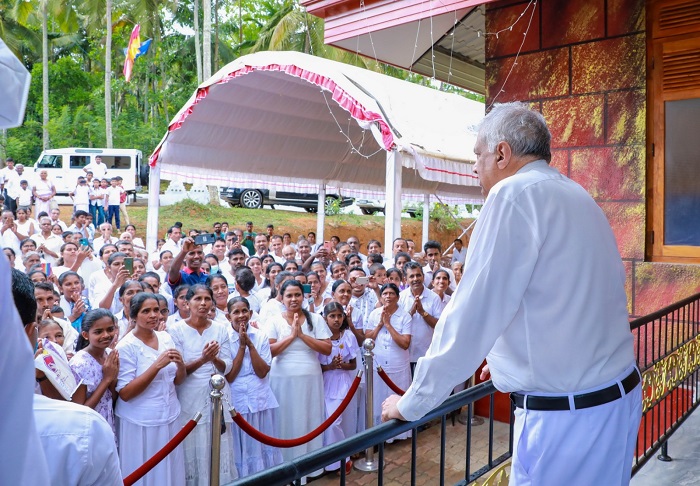
President Ranil Wickremesinghe announced the implementation of an Artificial Intelligence program to promote Theravada Buddhism on an international scale.
According to the President’s Media Division (PMD), the President reaffirmed his dedication to securing and promoting Theravada Buddhism on an international scale.
The President said the Artificial Intelligence program will be implemented to support these efforts, collaborating with educated individuals under the guidance of the Maha Sangha of the three chapters.
President Wickremesinghe made this statement in Matale during the 73rd National Upasampada Vinaya Karma Inaugural Ceremony of the Maha Viharavanshika Sri Lanka Ramanya Maha Nikaya, where 300 novice monks attained the higher ordination of Upasampada Sheela.
During the event, President Wickremesinghe conferred the “Philosophy Scholar Degrees,” Sri Sannaspatha, and Vijinipatha to the Most Venerable Makulewe Vimala Nayaka Thero of the Ramanya Maha Nikaya.
Additionally, he presented Sannaspatras to Ven. Mugunewela Anuruddha Thero and Ven. Mugunewela Anuruddha, the Chancellor of Uva Wellassa University.
In honour of his participation in the 73rd Upasampada Vinaya Karma of the Sri Lanka Ramanya Maha Nikaya, the President was bestowed with a commemorative gift.
Furthermore, the Ramanya Maha Nikaya presented the “Patipada Sasthriya Sangraha” to both the Mahanayake Thero and President Wickremesinghe.
The 73rd National Upasampada Discipline of the Sri Lanka Ramanya Maha Nikaya will be held from July 20th to July 27th at the Sudu Ganga Udakukkhepa Seminary in Matale Bandarapola.
The PMD stated that amidst the religious rituals, the Maha Sangha offered blessings and Seth Pirith Sajjayana to the President.
Engaging warmly with the attendees, President Wickremesinghe sought to learn more about their experiences and concerns.
The full statement of President Ranil Wickremesinghe;
“With immense joy, I partake in the auspicious 73rd Upasampada Mahotsava of Ramanya Maha Nikaya. My heartfelt gratitude goes to the Lords and the Donor Council for accommodating my presence, despite my ongoing official visit to India to strengthen bilateral relations.
During this visit, I express my sincere appreciation to the Indian government for its unwavering support during our country’s economic challenges. The ties between our nations are crucial for mutual growth and prosperity.
The Upasampada festival held by Ramanya Maha Nikaya in Matale holds profound significance for Buddhists, as this city plays a vital role in Buddhist history. It was at the Matale temple where the first steps were taken to enshrine and protect the Tripitaka—the sacred scriptures of Buddhism. As a government, we remain devoted to safeguarding the Tripitaka, for its preservation is synonymous with preserving the Noble Truth. Being a Buddhist nation, it is our earnest endeavour to promote Buddhism globally and share its wisdom with the world.
The Tripitaka holds significance in both Mahayana and Theravada Buddhism, with the Chinese-printed Mahayana Tripitaka, containing the Lotus Sutra, considered the world’s first printed text. Today, with advancements in technology, we can utilize Artificial Intelligence to protect and propagate the Dharma more effectively.
By inputting vast amounts of Buddhist data into Artificial Intelligence systems, we enable them to answer any questions about Buddhism accurately. This technology can provide insights into historical figures like King Dutugemunu and Queen Victoria, demonstrating its potential to enhance our understanding of Buddhist teachings.
Buddhism, unlike many religions, centers on the Dharma – a philosophy that one can choose to follow or not. By aligning with the Dharma, one can explore its depth and meaning. As we embrace the advancements in Artificial Intelligence, we must consider whether it may pose challenges or opportunities in the future.
Instances of distorted religious information on social media platforms, such as the case of Zen Buddhism in Japan, highlight the need to address these inaccuracies. While regulating such content legally proves challenging, it is essential for society to be vigilant and mindful of these distortions across all religions, including Buddhism and Christianity.
As we navigate the digital age, we must strive to use modern technology responsibly, ensuring that the core teachings of Buddhism and other religions remain intact, free from misrepresentation or manipulation.
To propel the dissemination of Theravada Buddhism globally through Artificial Intelligence, we recognize the need for thorough investigation and understanding. As a testament to our commitment, we have allocated 200 million rupees for these endeavours, with the flexibility to secure additional funding as required.
Our primary focus lies in utilizing Artificial Intelligence to spread the teachings of Theravada Buddhism worldwide. In this pursuit, a comprehensive analysis of Abhidharma is also on the agenda. We seek the invaluable guidance of the esteemed Maha Sangha to navigate this program successfully and, therefore, extend a cordial invitation to them for their invaluable insights.
In today’s digital age, religious reading habits have shifted, with fewer people engaging with traditional texts like the Bible and Tripitaka and instead resorting to social media browsing on their mobile devices. As Sri Lanka remains steadfast in its dedication to safeguarding Theravada Buddhism, we aspire to carry forward this noble cause by embracing Artificial Intelligence and collaborating with an educated and enlightened community.
To facilitate this mission, the President’s Secretary and the Secretary of the Buddha Shasana Ministry have been appointed to coordinate and lead these activities. We encourage all stakeholders to actively participate in discussions, ensuring the seamless progression of our efforts.
Together, with the integration of Artificial Intelligence and the wisdom of the Maha Sangha, we embark on a journey to preserve and propagate Theravada Buddhism, fostering its outreach and influence on a global scale.” (NewsWire)
